Leave a Comment:
How can you determine how much chlorine the Brita longlast filter removes but are unable to determine how much the standard Brita filter removes
ReplyWritten by: Gene Fitzgerald // Last Updated: Jan 31, 2024
This page may contain affiliate links. If you buy a product or service through such a link we earn a commission at no extra cost to you. Learn more.
Top Pick: What’s the Best Water Filter for Chlorine?
The best water filter for chlorine in 2024 is the SpringWell CF, because it reduces chlorine below the minimum detection level for 1 million gallons of water. It also removes other (organic) contaminants and improves water taste and odor, is easy to install and maintain, and backed by a satisfaction guarantee and lifetime warranty.
Dive into the realm of chlorine water filters that combat the water disinfectant like a superhero!
With a multitude of options available, navigating through the sea of choices can be overwhelming. Fortunately, our comprehensive guide, continuously updated since June 2018, will help you in making the best buying decision. It’s all based on extensive research, testing, and ranking of over 70 filters.
So, don’t waste your time and wave goodbye to chlorine-laden water!
| Chlorine Filters | Details | |
|---|---|---|
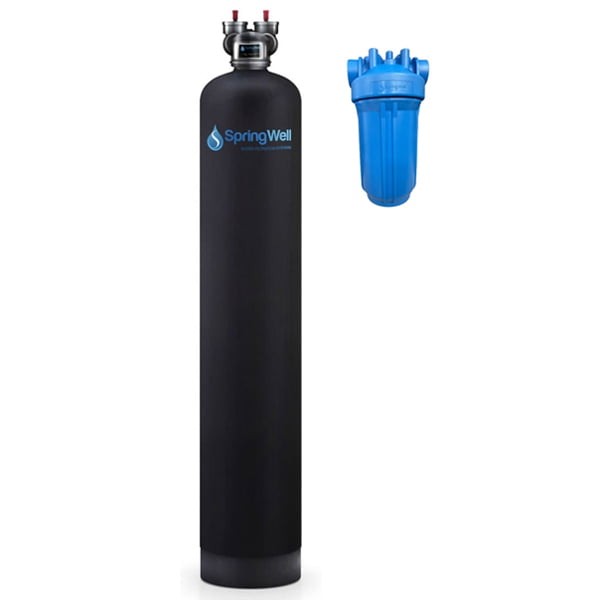 Best for Whole House: SpringWell CF Chlorine Water Filter |
Overall Rating: 5.0/5.0
Get 5% Off! Use Code: |
Price: $$$ Type: Whole House Chlorine Reduction: Up to 99.6% NSF: – Warranty: Lifetime (Limited) Read Review: Click Mike’s Video Review: Click |
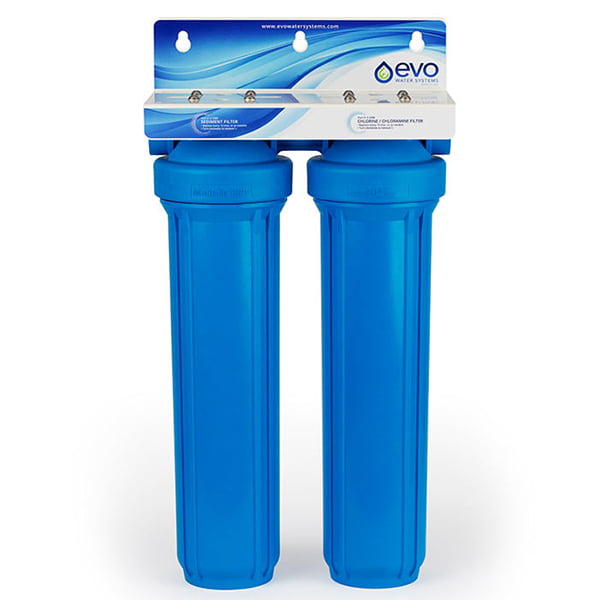 Budget Pick for Whole House: Kind Water Systems E-1000 |
Overall Rating: 4.5/5.0
Get 5% Off! Use Code: |
Price: $$$ Type: Whole House Chlorine Reduction: Extremely High NSF: – Warranty: Lifetime (Limited) Read Review: Click Mike’s Video Review: Click |
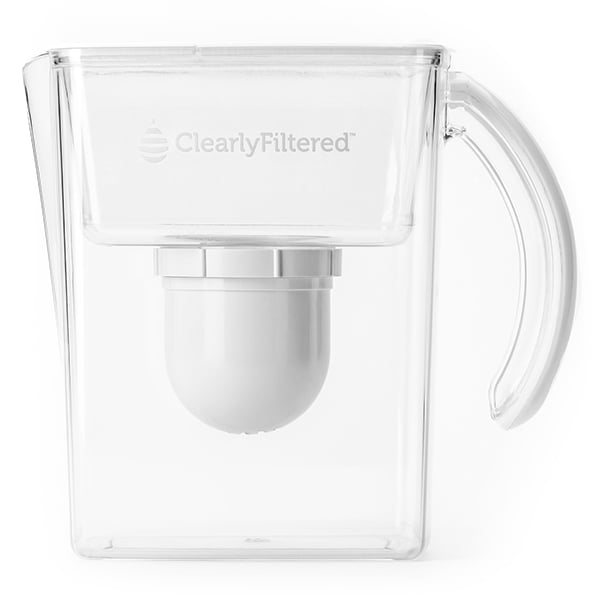 Best for Ease of Use: Clearly Filtered Pitcher |
Overall Rating: 5.0/5.0
Get 10% Off! Use Code: |
Price: $ Type: Water Filter Pitcher Chlorine Reduction: 99.5% NSF: 42, 53, 401, P473 Warranty: Lifetime (Limited) Read Review: Click Alexa’s Video Review: Click |
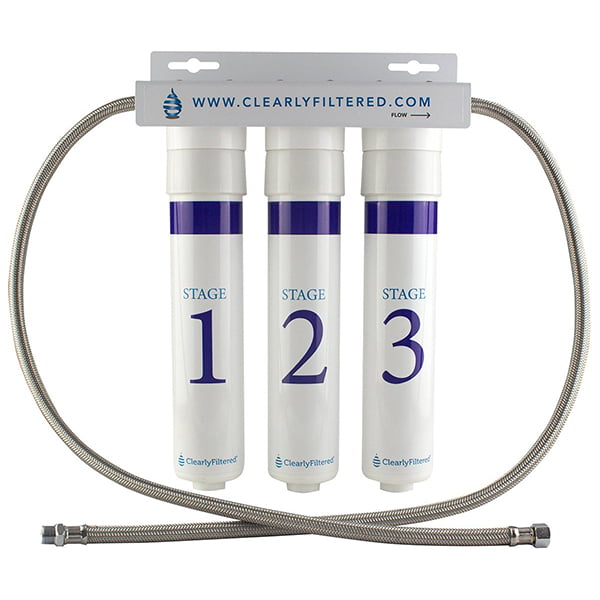 Best for Under the Sink: Clearly Filtered 3-Stage |
Overall Rating: 5.0/5.0
Get 10% Off! Use Code: |
Price: $$ Type: Under Sink Chlorine Reduction: 98.6% NSF: 42, 53, 401 Warranty: Lifetime (Limited) Read Review: Click Alexa’s Video Review: Click |
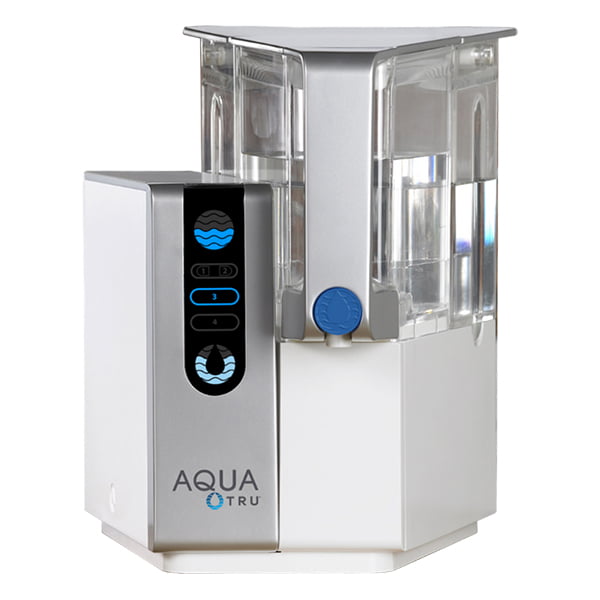 Best for RO Water Treatment: AquaTru |
Overall Rating: 4.5/5.0
Deal Includes Free Replacement Filter Set + 15% Discount Code |
Price: $$ Type: Reverse Osmosis Chlorine Reduction: 96.6% NSF: 42, 53, 58, 401, P473 Warranty: 1 Year Read Review: Click Alexa’s Video Review: Click Sara’s Video Review: Click |
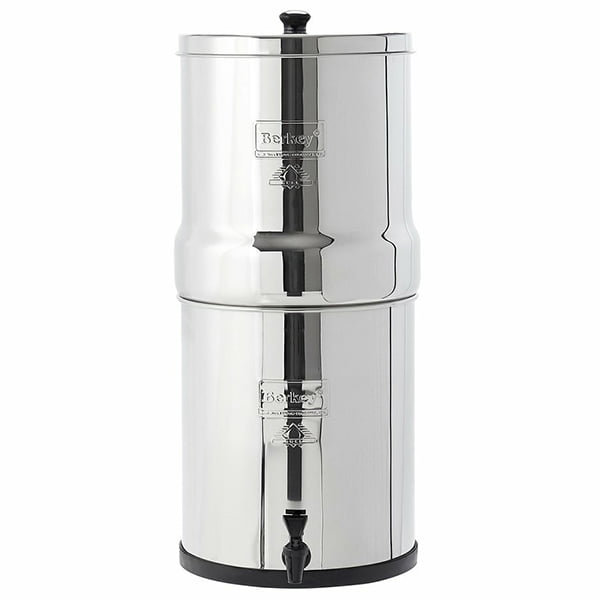 Best for Countertop/Gravity Filtration: Big Berkey |
Overall Rating: 4.5/5.0
|
Price: $$ Type: Gravity System Chlorine Reduction: 99.9% NSF: 42, 53 Warranty: 2 Years to Lifetime Read Review: Click |
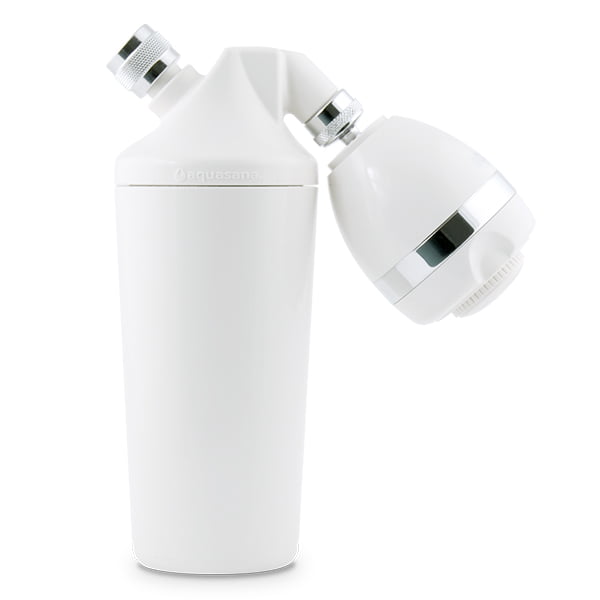 Best for Chlorine-Free Shower Water: Aquasana AQ-4100 |
Overall Rating: 4.5/5.0
Get Up to 50% Off! Use Code: |
Price: $ Type: Shower Filter Chlorine Reduction: 91.61% NSF: 177 Warranty: Lifetime (Limited) Read Review: Click Alexa’s Video Review: Click |
Our Top Picks
In our opinion, the best water filter for chlorine in 2024 is the SpringWell CF. That’s because it uses a mixture of catalytic carbon and KDF to remove a broad range of contaminants including 99.6% chlorine taste and odor from your water at the point of entry (whole house water filter).
Thus, it makes even the nastiest waters taste good. 5 stars!
Mike’s Video Review
Mike, one of our inhouse video content producers, has ordered, installed, and tested the SpringWell CF Whole House Water Filter in his own home – including lab testing for contaminant reduction rates. You cannot get more hands-on experience than that! Mike has documented the entire process and shares his findings the video below:
Other Specs
Key Features & Pros
Cons
Our Rating
Best for
The SpringWell CF is best for people who want a whole house water filter that effectively removes chlorine and other chemicals, and that’s easy to install and maintain.
→ Full Review: SpringWell Water CF1, CF4 & CF+
In case you find the SpringWell CF too expensive, here is a more affordable whole house filter option: The Kind Water Systems E-1000. Instead of a large tank, it uses replaceable filter cartridges. One is filled with catalytic activated carbon – ideal for removing chlorine and chloramine tap water.
Mike’s Video Review
Mike, one of our inhouse video content creators, has ordered, plumbed in, and tested the Kind E-1000 whole house filter in his new home – including a water quality analysis for contaminant reduction rates. 100% hands-on experience! Mike has documented the entire process and shares his findings in the video below:
Other Specs
Key Features & Pros
Cons
Our Rating
Best for
The E-1000 by Kind Water Systems is best for people who want an affordable yet effective whole house chlorine water filter.
→ Get the Full Kind Water Systems E-1000 Review
In our opinion, by far the best water filter to remove chlorine in the pitcher category in 2024 is the Clearly Filtered.
The unit is NSF-tested against Standard 42 for 99.5% chlorine reduction. Plus, it’s tested to remove more than 360 other water contaminants including 99.3% lead, 99.7% chloramine, and 97.8% chromium 6.

Clearly Filtered Pitcher |
|
| Price: | $ |
| Type: | Water Filter Pitcher |
| Ability to Remove Chlorine: | 99.5% |
| NSF Testing: | 42, 53, 401, P473 |
| Warranty: | Lifetime (Limited) |
|
Overall Rating: 5.0/5.0
Get 10% Off! Use Code: |
|
Alexa’s Video Review
Alexa, our inhouse video content producer, has ordered and tested the Clearly Filtered Water Pitcher with her own hands. In other words, she has assembled and used the pitcher at home for several weeks to gain invaluable first-hand experience and insights. Alexa has documented the entire process and shares her opinion in the video below:
Other Specs
Key Features & Pros
Cons
Our Rating
Best for
The Clearly Filtered is best for people who want a chlorine filter pitcher that’s easy to use, highly effective, and affordable.
→ Full Review: Clearly Filtered Pitcher
If you’re looking for an under sink water filter to solve your chlorine problem, look no further. The Clearly Filtered 3-stage is the best one on the market.
It provides refreshing and clean drinking water free from 230+ potential contaminants that may be lurking in your water. Average chlorine removal according to standardized NSF testing: 98.6%.

Clearly Filtered 3-Stage Under Sink Water Filter |
|
| Price: | $$ |
| Type: | Under Sink |
| Ability to Remove Chlorine: | 98.6% |
| NSF Testing: | 42, 53, 401 |
| Warranty: | Lifetime (Limited) |
|
Overall Rating: 5.0/5.0
Get 10% Off! Use Code: |
|
Alexa’s Video Review
As part of the BOS team, Alexa has installed and tested the Clearly Filtered Under-the-Sink Water Filter System in her own home and with her own hands. She has used the system for several weeks to gather genuine first-hand experience. And most importantly, Alexa has documented the entire process, including her findings and personal opinion, in the video below:
Other Specs
Key Features & Pros
Cons
Our Rating
Best for
The Clearly Filtered 3-Stage is best for people who want an under sink water filter for chlorine removal, one that’s compact, easy to install and use, and very effective.
→ Read Full Review: Clearly Filtered 3-Stage
If you like reverse osmosis systems, you’ll love the AquaTru. The countertop system is our top choice – rigorously tested and NSF certified (96.6% chlorine reduction), installation-free, compact, and easy to use. 4.5 stars!

AquaTru Countertop Reverse Osmosis System |
|
| Price: | $$ |
| Type: | Reverse Osmosis |
| Ability to Remove Chlorine: | 96.6% |
| NSF Certifications: | 42, 53, 58, 401, P473 |
| Warranty: | 1 Year |
|
Overall Rating: 4.5/5.0
Deal Includes Free Replacement Filter Set + 15% Discount Code |
|
Alexa’s Video Review
Alexa, our inhouse video content producer, has ordered and tested the AquaTru Reverse Osmosis System. In other words, she set up the AquaTru with her own hands and used it in her home for several weeks to gain invaluable first-hand experience and insights. Alexa has documented the entire process and shares her opinion on the water filter in the video below:
Sara’s Video Review
Sara has also tested the AquaTru. And here review even includes lab testing, so a comparison of the unfiltered vs. filtered water:
Other Specs
Key Features & Pros
Cons
Our Rating
Best for
The AquaTru system is best for people looking for an RO filter that’s compact, installation-free, really effective, and ideal for removing chlorine.
When you use a Berkey gravity system, like the Big Berkey, with Black Berkey Purification Elements, you get a water filter that really excels at removing the different forms of chlorine in drinking water. Free chlorine is removed to more than 99.9%, according to testing. And residual chlorine, chloride, and even chloramine are removed to below the lab detectable limits.
In addition to that, the Big Berkey gravity water filter system removes

Big Berkey Gravity Water Filter |
|
| Price: | $$ |
| Type: | Gravity Water Filter |
| Ability to Remove Chlorine: | 99.9% |
| NSF Certifications: | 42, 53 |
| Warranty: | 2 Years to Lifetime |
|
Overall Rating: 4.5/5.0
|
|
Other Specs
Key Features & Pros
Cons
Our Rating
Best for
The Big Berkey is best for people who want a gravity filter capable of eliminating chlorine ideal for home use and prepping.
→ Read: Full Big Berkey System Review
If you want to enjoy chlorine-free showers, a shower filter is a budget-friendly alternative to a whole house water filter. And the best for this purpose is the Aquasana AQ-4100/4105.
It’s NSF standard 177 tested for 91.61% chlorine removal for 10,000 gallons. Of course, it also reduces other contaminants including lead, hydrogen sulfide, iron, and mercury, for much better air and water quality inside the shower.

Aquasana Shower Filter |
|
| Price: | $ |
| Type: | Shower Filter |
| Ability to Remove Chlorine: | 91.61% |
| NSF Testing: | 177 |
| Warranty: | 1 Year |
|
Overall Rating: 4.5/5.0
Get Up to 50% Off! Use Code: |
|
Alexa’s Video Review
Being an integral member of our team, Alexa has ordered and tested the Aquasana Shower Filter for us, meaning she has installed, primed, and used the filter in her day-to-day life for several weeks to gain some first-hand experience. She shares her findings and personal verdict in the video below:
Other Specs
Key Features & Pros
Cons
Our Rating
Best for
Aquasana’s AQ-4100 and AQ-4105 is best for people looking for a chlorine shower filter that’s easy to install and maintain, long-lasting, and affordable.
(Mobile Hint: Swipe to Scroll)
| Chlorine Water Filters | Price | Yearly Cost | Type | Chlorine Removal | NSF/ANSI | Filter Life | Media | Warranty | Additional Info |
|---|---|---|---|---|---|---|---|---|---|
| SpringWell CF Water Filtration System | $$$ | ~$40 | POE | Up to 99.6% | – | 1,000,000 gal | Catalytic Carbon + KDF | Lifetime (Limited) | |
| Kind Water Systems E-1000 | $$$ | ~$145 | POE | Extremely High | – | 1 Year | Catalytic Carbon | Lifetime (Limited) | |
| Clearly Filtered Pitcher | $ | ~$150 | Filter Pitcher | 99.5% | 42, 53, 401, P473 | 100 gal | Carbon + Composite Shell | Life (Limited) | |
| Clearly Filtered 3-Stage Water Filter System | $$ | ~$440 | Under Sink Filter | 98.6% | 42, 53, 401 | 2,000 Gallons | Carbon + Proprietary Blend | Lifetime (Limited) | |
| AquaTru RO System | $$ | ~$100-120 | RO | 96.6% | 42, 53, 58, 401, P473 | 600-1200 Gallons | Carbon Filter, RO | 1 Year | |
| Big Berkey Water Filter System | $$ | ~$55 | Gravity Filter | 99.9% | 42, 53 | 3,000 gal | Carbon | 2 Years to Life | |
| Aquasana AQ-4100 & 4105 Water Filters | $ | ~$120+ | Shower Filter | 91.61% | 177 | 10,000 gal | Carbon + KDF | 1 Year |
The following are key features worth considering when shopping for a water filter to remove chlorine. They will help you choose the right on for your needs and budget.
Before you even think about buying a chlorine filter, you should have your water tested to determine the level of chlorine as well as other contaminants in your tap water supply.
Only with this information at hand can you choose the most appropriate filter system.
NSF testing and certifications are your only guarantee that a water filter performs as advertised by the company behind it.
NSF International is an independent institution that establishes public health and safety standards which products like water filters can be verified against.
For chlorine water filters, look for NSF Standard 42. Shower filters that remove chlorine are tested according to NSF Standard 177.
As a tap water contaminant, chlorine is one of the easiest to remove. Thus, you have a large selection of water filter types and models. Above, you’ll find a selection of the best products from each category.
All water filters, but whole house water filters in particular, need to be capable of providing enough water within a given time period. This is determined by a filter’s flow rate.
A water filter that’s too slow processing the water may lead to extended waiting times or a drop in water pressure.
As far as filtration capacity is concerned, filter cartridges with a long service life save you from frequent replacements which is more convenient and often also more affordable.
How much time and effort goes into installing and maintaining a water filter primarily depends on its type. For example, whole house water filtration systems are certainly more difficult to get up and running than a simple water filter pitcher.
More on Chlorine Water Filters
Simply put, chlorine is added to U.S. tap water supplies for disinfection. In other words: To kill parasites, bacteria, and viruses that could otherwise cause diseases.
Thus, water chlorination makes water safe to drink. Introduced in 1908, it has helped to eliminate waterborne diseases like typhoid fever saving tens of thousands of lives.
Furthermore, it is estimated that municipal water chlorination “played a major role in increasing Americans’ life expectancy by 50 percent during the 20th century”. The CDC calls it “one of the most significant public health advances in U.S. history”.
And lastly, chlorine also helps to reduce unpleasant tastes and odors.
Chlorine levels up to 4 ppm are considered safe in drinking water.
Also, the benefits of water chlorination far outweigh any health risks from possible disinfection byproducts, which form as an unintended consequence of adding chemically-reactive chlorine to water containing small amounts of organic matter.
Still, there are risks associated with these byproducts. Among the most critical are trihalomethanes, or short THMs. Studies showed that lab animals exposed to very high levels of trihalomethanes had an increased risk of cancer. Studies on humans found a link between long-term exposure to high levels of chlorination byproducts and a higher risk of cancer.
THMs may also have an effect on pregnancy. A study found that pregnant women who drank large amounts of tap water with high THMs had an increased risk of miscarriage.
That being said, we want to stress that the aforementioned studies neither prove a link between chlorination byproducts and cancer nor between CBDs and miscarriage. They simple show a need for further research.
Chlorine can affect the outer layer of your skin stripping it from its natural oils causing dryness, itchiness, and even rashes. This may even lead to premature aging.
The same applies to your hair. Without its natural oil, you hair may become brittle. Plus, chlorine can change your hair’s natural color.
Filtration is the most straightforward approach to removing chlorine from water. There are two ways you can approach this:
When you consider that a large proportion of our daily exposure to chlorine and its disinfection byproducts does not come from the water we drink, but from what our skin absorbs and our lungs inhale in the shower, going the POE route makes a lot of sense.
Second, no matter what type of chlorine water filter you choose, what’s important is that it utilizes at least 1 activated carbon filter block or granular activated carbon filter stage (catalytic carbon filters work as well).
As a filter medium, carbon adsorbs up to 99.9% of free chlorine and many other natural and synthetic contaminants from water and traps them in the tiny pores on its surface.
Thereby, chlorine removal is a function of contact time with the filter medium. In other words: When it comes to carbon filters, appropriate sizing is critical. The more water that needs to be processed within a given period of time, the larger the filtration system needs to be.
A viable but less common alternative to carbon filtration is UV light water treatment. Broad-spectrum ultraviolet systems reduce chlorine and chloramines into easily removed byproducts.
How? Wavelengths between 180 nm and 400 nm trigger a photochemical reaction that dissociates free chlorine forming chloride ions/hydrochloric acid.
Simply put, distillation provides water of the highest purity. Chlorine stands no chance of surviving the water treatment process, provided that there is a way for the gas to escape.
The reverse osmosis membrane itself is not suited for filtering chlorine. In fact, chlorine causes damage to an RO membrane.
Fortunately, every single reverse osmosis system we reviewed applies at least 1 carbon pre-filter to eliminate most of the chlorine before it gets the chance to even touch the reverse osmosis membrane.
Yes, they do.
Comparing the three, the Brita Standard is the least effective and lasts for a mere 40 gallons. Brita Elite and Brita Complete are similar in terms of contaminant reduction rates and filtration capacity. One Elite cartridge can treat up to 120 gallons of drinking water. Complete replacement filter elements are good for 100 gallons.
PUR’s standard and PLUS pitcher filters remove at least 96.9% of chlorine. The PUR faucet mounted filter removes about 96% chlorine plus 99.7% THMs, a group of harmful disinfection byproducts.
As far as ZeroWater is concerned, the filter pitcher reduces 97.4% of chlorine, according to a test conducted by NSF International. It’s also known for removing more than 99% of TDS (Total Dissolved Solids). However, the handling is rather difficult. And it’s one of the slowest pitchers you can buy with a low filtration capacity so that replacement cost will add up quickly.
Does boiling water remove chlorine? Yes, you can boil chlorine out of water, although the term boiling might be misleading. It’s enough to heat up the water, no need to actually boil it.
How long does it take for the chlorine to dissipate? Simply heat for 10 to 20 minutes and voila, all chlorine will be gone. (The exact time required could be much lower depending on the amount of water and chlorine concentrations.)
Yes, chlorine as a gas at room temperature is a volatile solute that evaporates from water over time, escaping into the surrounding air.
How long does water need to sit to dechlorinate?
This depends on water temperature and surface area, air temperature, and the level of dissolved chlorine. For example: If you put a large but very flat bowl of chlorinated tap water out in the sun, the dechlorination process will be much faster than if you were to put a glass of the same amount of tap water in your refrigerator.
By the way, apart from UV light, aeration and circulation can speed up the process.
Generally speaking, you should let the water sit for about 24 hours, although chlorine taste and odor might have vanished after a couple of minutes. For more control over the process use chlorine test strips to determine how much of the water disinfectant is left.
Your last option is to use a dechlorination agent, short dechlorinator, a.k.a. chlorine neutralizer or chlorine remover.
There are different chemicals available including potassium metabisulfite, sodium thiosulfate, sodium sulfite, and vitamin C.
The main benefit of using a dechlorinator is that it works relatively fast. Required contact time: A mere seconds up to 5 minutes.
Questions? Ask away!
Information provided on BOS is for educational purposes only. The products and services we review may not be right for your individual circumstances.
We adhere to strict editorial guidelines. Rest assured, the opinions expressed have not been provided, reviewed, or otherwise endorsed by our partners – they are unbiased, independent, and the author’s alone. We fact-check all content for accuracy. It is accurate as of the date posted and to the best of our knowledge.
How can you determine how much chlorine the Brita longlast filter removes but are unable to determine how much the standard Brita filter removes
Reply